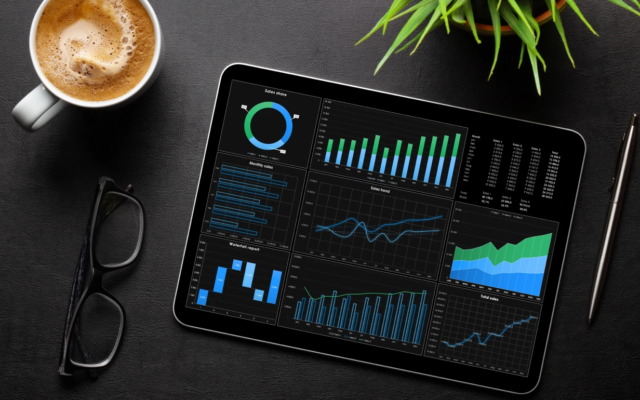Let’s be honest: real estate looks striking on a pitch deck: high foot traffic, a nice layout, and a competitive price. Add a few upward-trending graphs, and it’s easy to believe you’ve found the perfect deal.
But give it six months, and suddenly maintenance costs have skyrocketed. Tenants start leaving. And potential clients drop. What looked like a win slowly turns into a money drain.
The real estate industry is full of unknowns. Pricing is often based on intuition rather than actual numbers. Deals are lost because of slow, outdated processes. And sometimes properties fail to work with no clear reason why. Real estate investors feel concerned and confused.
Meanwhile, the market keeps growing. According to Technavio, the global property market is projected to reach $1,258.6 billion by 2029, with a CAGR of 5.6%.
Sounds a bit contradictory, right? On one hand, realtors face serious challenges. On the other hand, the market is booming. So, what separates the winners from the rest? One key success factor is the smart use of real estate data analytics.
Today, data analytics techniques can turn commercial real estate chaos into clarity. Tools like CoStar and REoptimizer help you track market trends and make smarter investment decisions. Tableau and Power BI can provide you with a clear picture of your business performance. In short, property is an attractive vertical, especially when you use the right software to make sense of your historical data.
So, how exactly can data analytics help your real estate business? Keep reading. We’ll break it down step by step.
What Is Real Estate Data Analytics?
Real estate data analytics is the process of analyzing property and market data to uncover valuable insights and support quicker decision-making.
Data analytics in real estate enables professionals to make more informed choices when buying, selling, renting, or managing properties.
It begins with collecting relevant data from different sources. Then, that data is studied and turned into clear, helpful strategies. Brokers, real estate investors, and property owners use this data to identify qualified tenants and secure more favorable deals.
To make this easier, data analytics companies offer ready-to-use data, simple software, and tools powered by data science and machine learning techniques. These technologies help turn complicated data into valuable business insights.
How Real Estate Analytics Can Work for You
Now that you understand what real estate data analytics means, it’s time to see what value it can bring to you. But we recommend considering your role in real estate, whether you’re an agent, an investor, or someone else, because that makes all the difference. So, we’ve divided the benefits according to different roles.
For investors:
- Smarter investment decisions: Data analytics in commercial real estate helps you spot opportunities by showing market trends and economic conditions. As a result, this reduces risks and boosts your confidence in the industry.
- Optimized portfolio: By evaluating how each property performs, you can decide which assets to keep, sell, or acquire. So, this maximizes returns while minimizing risk.
- Accurate predictions: Using historical data and AI models, you can forecast market shifts and identify high-growth areas before others.
- Reduced investment risks: Early analysis of economic downturns and other risk factors helps you protect your investments from potential losses.
For property developers:
- Right property valuations: Real estate data analytics delivers precise property value assessments. That’s why you can price accurately and maximize your returns.
- Efficient property management: With predictive analytics for real estate, you can speed up everything from tenant screening to maintenance scheduling. So, your operations are faster and more cost-effective.
- Better cost forecasts: By analyzing construction, materials, and labor data, you can create realistic budgets and avoid financial surprises.
- Smarter project planning: Data analytics helps you evaluate design options, allocate resources wisely, and prevent issues before they disrupt your timeline.
For real estate agents:
- Targeted marketing: With data, you can tailor campaigns for specific audiences. As a result, you’ll get higher engagement and conversion rates.
- Better client experience: Understanding client preferences through data lets you provide more personalized service. So, your customers will be happier and more satisfied with your services.
- More leads: Data insights help real estate investors identify the most promising buyers and sellers. That’s why it solves the dilemma of how to generate more leads.
- Accurate property evaluation: With market data, you can confidently assess property values, build trust, and close deals faster.
Real estate data analytics has a lot to offer. First, it gives you a clear view of market trends and property values. Second, it helps you spot and reduce risks in investments and property management. Third, it lets you make smarter data-driven decisions. And finally, it assists you in automating routine tasks and boosting your business productivity.
Want to add data analytics to your solution? Contact us, and we’ll help you run your business in accordance with your dataset insights.
How You Can Use Real Estate Data to Win Big
Today, the real estate business is more than finding a great location and reacting swiftly. To stay competitive, you need solid insights, which you can receive with data analytics.
Whether you’re investing, managing buildings, or filling empty units, data helps you make more actionable decisions. But let’s review specific scenarios to see how to use your datasets.
Predict profitable investments
Imagine the situation: you’re thinking about buying a commercial building in a growing neighborhood. You pull data on local foot traffic, new business openings, and rental prices. The numbers show a steady increase in demand for retail space in the area. That gives you the green light to invest with more confidence and less risk.
Real estate data analytics lets you do this consistently. By analyzing historical occupancy rates and business growth nearby, you can spot the best opportunities and avoid properties that might flop.
Make property management easier
Picture this: you own several rental properties. Lately, one building has more vacancies than usual. You dive into the data and notice that most people who tour the property don’t end up renting. The analytics also show that a nearby competitor just upgraded their amenities. You decide to make small but targeted improvements, like adding better lighting and faster Wi-Fi. The result? More leases signed within a month.
Data analytics in real estate also reveals patterns you might otherwise miss: peak viewing times or seasonal dips in demand. With this knowledge, you can plan upgrades, adjust pricing, or improve your interaction with prospects. Data helps real estate investors monitor performance, spot issues early, and act quickly.
Tailor your marketing to the audience’s needs
Let’s say you’ve got a few vacant apartments in a student-heavy area. Instead of running a general ad campaign, you use demographic and social media data to target students at nearby universities. You highlight things they care about, like distance to campus and flexible lease terms. Within weeks, your listings get more views and your units fill up faster.
Real estate data analytics helps you target the right audience and allocate your marketing budget where it will be most effective. It’s a good way to attract the right tenants without wasting time or money.
All these use cases prove that big data, generative AI tools, and predictive analytics can work to your advantage. The goal isn’t just to collect property data but to turn that data into real results. So, you can extend the scope of data analytics in your business.
The Secret Sauce Behind Great Real Estate Analytics Tools
The market stall is full of options: SmartZip, Catalyze AI, Top Producer, and more. But not all tools deliver what your business needs. Some provide clear, actionable insights. Others? Just noise.
So how do you know which one’s right for you? Here’s a quick checklist to make sure your next tool is worth your time (and money):
Accurate data
- Uses verified sources
- Algorithms ensure accuracy
- Adjusts for sample size and bias
- Reliable POI (point of interest) data
Specific insights
- Data down to the property or street level
- More specific than zip code averages
- Shows real-world activity in exact locations
Up-to-date data
- The visit data is current, collected just days ago
- Uses the latest census and demographic info
- Reflects current trends and changes
Full data coverage
- Combines all relevant data types
- Includes traffic, trends, economics, and weather
- Provides a complete view for analysis
Interactive interface
- Easy to use
- Surfaces key insights
- Helps you make fast decisions
Privacy-safe
- No personal identifiers
- Data shown in aggregate
- Built with privacy best practices
If your tool hits all these points, you’re on the right track. If it doesn’t? Keep looking.
If you need help choosing data analytics tools and integrating them into your system, contact Forbytes. We’ll provide you with tailored solutions.
The Best Real Estate Analytics Tools for You
Now that you know the key criteria for a quality data analytics tool, we’ve prepared a list of options to support your business or even serve as a foundation for building custom solutions. Let’s take a look:
Zillow
Zillow is a popular real estate platform where you can search for homes and check their value across the U.S. It also offers tools for agents to track leads and advertise their services.
Strengths
- Huge audience: Zillow gets over 200 million visitors each month, making it the most well-known real estate site.
- Zestimate tool: It gives automatic home value estimates with a small error rate (2.3%) for listed homes.
- Premier Agent Program: Helps agents track leads and run ads to grow their business.
- Trusted brand: Zillow is ranked the top real estate brand in the world.
Weaknesses
- High fees: Selling or buying through Zillow can cost more than using competitors like Redfin or Opendoor.
- Fewer seller leads: Its programs focus more on buyers, not sellers.
- Zestimate issues: For off-market homes, value estimates can be off by around 7.5%, which may confuse sellers.
Why it’s great for your business: If you’re looking to generate more leads, boost your market visibility, or connect with potential buyers, Zillow can be a strong ally. It’s useful for real estate agents who want to grow their brand and keep track of how well their listings and campaigns are performing.
SmartZip
SmartZip is a top tool for real estate agents who want high-quality home seller leads and better listing opportunities.
Strengths
- Predictive power: SmartZip uses 250+ data points to spot potential sellers up to 18 months before they’re ready to move.
- Automated marketing: With SmartTargeting, you can run campaigns across email, direct mail, and online ads, all on autopilot.
- Boosts reputation: Reach150 helps you collect reviews and generate referrals without extra effort.
- Easy CRM integration: Works smoothly with tools like Top Producer and BombBomb.
Weaknesses
- It’s pricey: Plans start at $299/month and require a year-long commitment.
- No mobile app: You’ll need a computer, and that is not ideal for agents on the go.
- Takes time to learn: Getting set up can be a bit of a process.
Why it’s great for your business: SmartZip is a great tool if you’re trying to win more listings, especially in tough markets with few sellers. It helps you find the right people to target and keeps your outreach running in the background.
Homebot
Homebot is your home advisor. It tracks your home’s value, monitors equity growth, and delivers tailored financial insights, helping you make smarter decisions about your biggest asset.
Strengths
- Monthly home value updates: Sends automatic emails with your home’s estimated value using trusted data from Altos Research.
- Zillow plugin: Gives real-time insights while you’re browsing homes on Zillow.
- Refinance info: Shows personalized scenarios to help you understand your equity and mortgage options.
- Video messaging: Let your agent send custom videos to keep in touch and answer questions.
Weaknesses
- Mostly email-based: If you prefer texts or calls, it might not feel as personal.
- Limited tech connections: Some advanced tools only work if your lender is part of Homebot.
- Extra cost: There’s a $50 setup fee, and some features require a lender subscription.
Why it’s great for your business: Homebot helps you build stronger relationships with your clients. It keeps them engaged, educated, and thinking of you without extra work on your part.
These real estate data analytics tools can bring real value to your business, helping you understand the market and make smarter decisions. But if you have specific needs or a unique vision for how your software should work, off-the-shelf tools might not be enough.
That’s why we recommend custom solutions. With tailored software, you get exactly what your business needs, no extra features you’ll never use, and no limitations holding you back.
Want to explore a custom real estate solution? Let’s talk about how we can build the right tool for your business goals.
Turn Data Into Deals: Your Guide to Real Estate Analytics
As you may understand, the right data analytics tool can give you a competitive edge. But how to integrate data analytics into your business? We’ve prepared a step-by-step guide to assist you.
Step 1. Define your goals: Ask yourself: What questions do I want to answer with data? Whether it’s identifying top-performing agents, optimizing listings, or predicting market shifts, clarity here will shape your entire analytics strategy.
Step 2. Choose the right tool (or build one with Forbytes): You can choose off-the-shelf tools like Tableau or Power BI, or go custom. Our team develops AI-driven data analytics and reporting platforms tailored to your unique business needs.
Step 3. Connect all your data sources: You’ll need to pull data from your CRM, MLS listings, property management software, marketing platforms, and more. We can help you connect, store, and process all this data into one intelligent system.
Step 4. Clean & structure your data: Clean data is essential for reliable insights. Forbytes ensures your data is accurate, de-duplicated, and well-organized. So, your reports and forecasts are always on point.
Step 5. Create role-based dashboards: From agents to brokers to marketing teams, everyone needs access to different KPIs. We build custom dashboards so your team gets the right insights at the right time.
Step 6. Enable real-time reporting: With our real-time reporting systems, you’ll always have fresh insights at your fingertips, ready to drive immediate decisions.
Step 7. Automate & optimize: AI isn’t just about analytics, it’s about efficiency. With AI-driven reporting automation, your team spends less time on manual reports and more time acting on insights.
Ready to turn data into decisions? Forbytes is here to help you build and integrate a smart, AI-powered analytics platform, fully tailored to your real estate business.
Your Next Move? Smarter Decisions with Real Estate Analytics
With the right data, you can predict trends, spot the most profitable opportunities, and optimize how you manage, market, and grow your business.
Whether you’re an investor, agent, or property manager, real estate data analytics can help you reduce risks, boost ROI, and stay ahead in a competitive market. But to get the full benefits, you need more than off-the-shelf software; you need a solution that fits your business.
At Forbytes, we specialize in AI-driven analytics solutions for real estate. From custom dashboards and predictive models to real-time data reporting and seamless integration with your existing systems, we’ll help you turn raw data into real results.
Ready to future-proof your real estate business with smarter data decisions? Get in touch with Forbytes today and let’s build a solution tailored to your goals.














